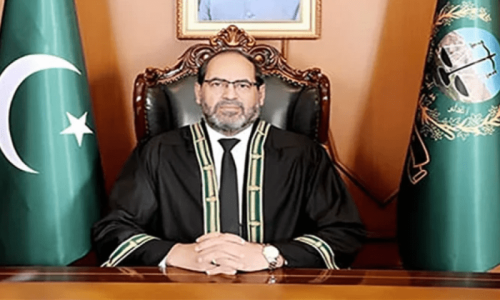The murmur of Quranic recitation can be heard from behind opaque glass doors at the Falah-e-Insaniyat Foundation (FIF) markaz in Chitral city on a chilly November evening. About 50 boys live and study at the four-year-old madressah here. Since July, when devastating flash floods hit Chitral, the centre has expanded into relief operations. It was in fact one of the most prominent actors in the relief effort — even though it has been on a government watch list since March 2012.
On one of the walls in the office of the centre’s administrator, Abdul Majeed, is a chart listing various activities FIF had undertaken for flood relief including delivery of food, medical camps. “Sixty to 70 volunteers, mainly from our centres in Dir and Bajaur, were working with us,” said Mr Majeed. “We held 36 medical camps and two surgical camps for affected people.”
Take a look: JuD on front line of earthquake aid
Following the earthquake that struck the area last month, the centre is once again engaged in the relief effort, with 30 volunteers from outside Chitral and a few locals who are doing surveys of the affected areas. FIF has also set up camps in urban centres like Karachi where the organisation is openly raising funds and collecting donations for the quake victims.
That makes Pemra’s directive to satellite television and FM radio licensees, “not to give any kind of coverage to any proscribed organisation including Jamaatud Dawa [JuD], FIF [and] Lashkar-e-Taiba [LeT]” all the more baffling. Security analyst Muhammad Amir Rana believes it is an attempt by the government to follow through on Prime Minister Nawaz Sharif and President Obama’s joint communiqué issued during the PM’s recent visit to Washington. The statement reiterated Pakistan’s resolve to act against “all UN-designated terrorist individuals and entities, including LeT and its affiliates” in line with its international commitments. “There was pressure on him, and this is as far as the civilian government could go,” said Mr Rana.
For the FIF has friends in high places. It is affiliated with Hafiz Mohammad Saeed, head of the JuD — an organisation that is also on the government watch list — and founder of the now banned LeT, one of the militant groups deeply involved in jihadist activities in India-held Kashmir until a few years ago. Following international pressure in the wake of 9/11, the LeT — among several other militant organisations — was outlawed by president Musharraf in January 2002. Significantly, its leaders and activists had re-emerged in the form of JuD just prior to that.
The JuD later set up its welfare wing known as FIF. The defunct LeT’s well-known links with the establishment have continued through these organisations as well. Sources in Chitral city said they often come across security officials in civvies at the local FIF centre.
The space in Pakistan for religious organisations in disaster relief is expanding exponentially even as NGOs — both international and local — are increasingly being sidelined. In the massive 2005 earthquake, cadres of several such groups fanned out to provide relief to affected parts of Kashmir and Khyber Pakhtunkhwa, as they did in the floods in successive years from 2010 onwards. In September 2013, FIF along with Jamaat-i-Islami’s Al-Khidmat and the banned Jaish-e-Mohammed’s (JeM) Al Khair Trust were the organisations with the highest visibility after the earthquake in Balochistan’s Awaran district.
Even when the ongoing military operation in North Waziristan displaced tens of thousands of people from the area, relief camps for them in Bannu were being run by FIF and Al-Rahmat Trust — another welfare outfit of the JeM — with, according to the organisers, full cooperation from the army.
According to author and journalist Zahid Hussain, there are two aspects to the prominent involvement of outfits like FIF in charity and disaster relief. “The establishment’s stated position is that this is a way to de-radicalise the militant cadres,” he said. “After 2002, many militants [from organisations banned by Musharraf] turned their guns on the state, such as those from Jaish-e-Mohammed, and they didn’t want the LeT/JuD to do the same. At the same time of course, these groups are a useful counterweight against the civilian government.” He cites the example of the countrywide protests in July 2012 led by the Difa-e-Pakistan Council — an alliance of extreme right parties including the JuD — when the government announced the resumption in Nato supplies to Afghanistan after the Salala incident eight months earlier.
The insertion of such groups into Balochistan, say analysts, also serves as a tactic to sow divisions along religious lines to fracture the secular separatist movement in that province. “Even today, over two years after the earthquake in Awaran, there are no NGOs working there. There is only the FIF, with its madressahs, whereas it had absolutely no presence there before,” said a Baloch human rights activist.
The zero-tolerance policy against militant groups declared after the APS Peshawar attack on Dec 16 and formally articulated in the National Action Plan is clearly subject to certain exceptions. Even if, as the establishment maintains, those belonging to groups such as FIF have moved away from active militancy, mainstreaming them through charity work enables their ultra-conservative ideas to continue percolating through society.
“Religious organisations tend to have better access than NGOs into local communities mainly because of the prevailing mistrust against the latter and also because they often already have grass-roots networks,” said Mr Rana. “NGOs first have to build trust in an area. As a result, the outreach of the rightwing is growing. You can see it in the huge crowds they now attract at their rallies.”
Published in Dawn, November 21st, 2015














































